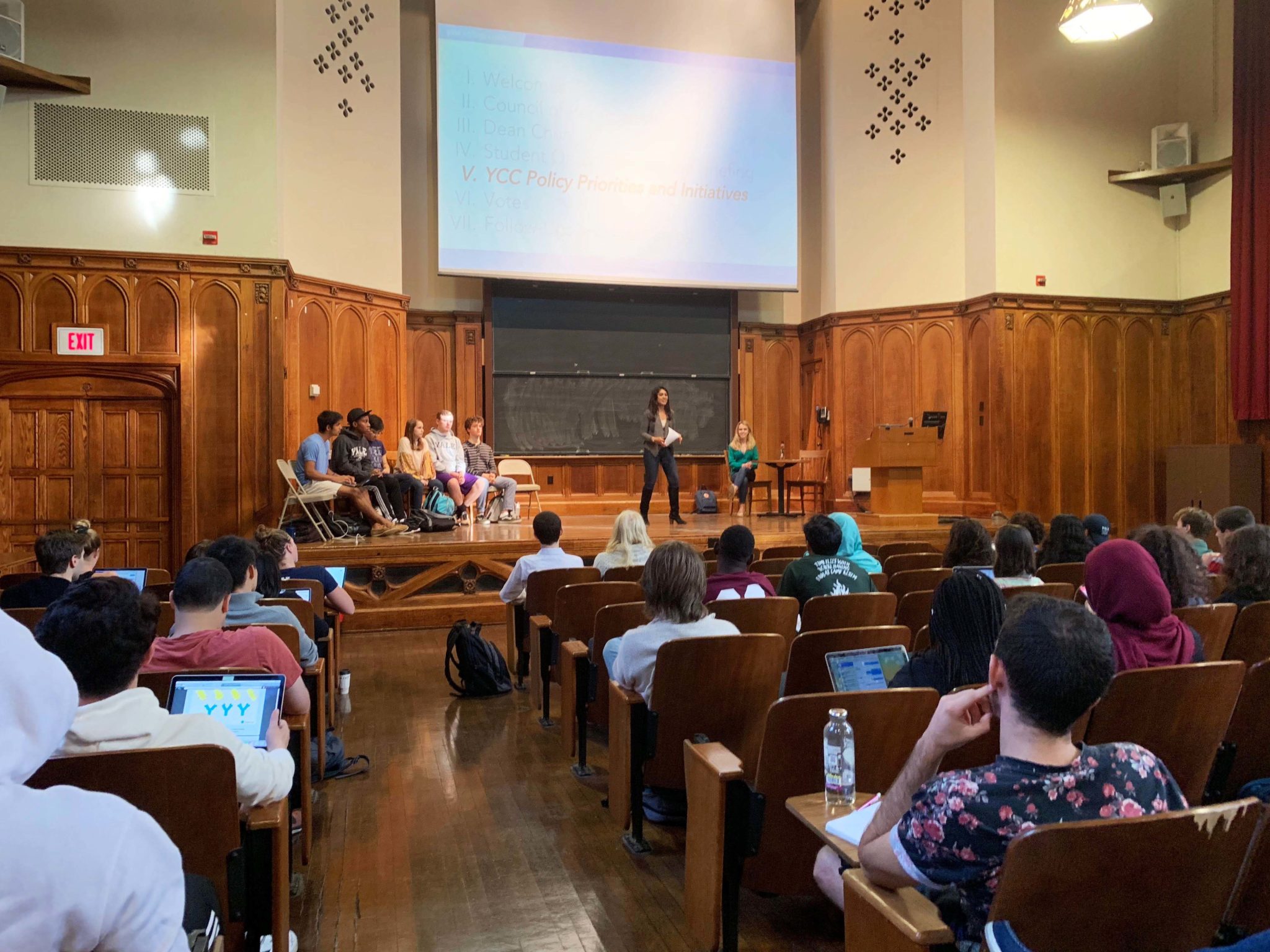
To the tune of High School Musical’s “We’re All in This Together,” 232 students filed into Sheffield-Sterling-Strathcona Hall for the inaugural meeting of the newly formed Yale College Council’s Council of Representatives.
The Council of Representatives, a body comprised of student leaders across campus, is a subsidiary body of the Yale College Council. The new council — meant to increase engagement between the YCC and the student body — was an idea proposed by YCC president Sal Rao ’20 and vice president Heidi Dong ’20 during their campaign last spring.
“Students’ strongest ties are no longer exclusively to their residential colleges,” Rao said at the start of the meeting. “They’re to their a cappella groups, sports teams, to their religious groups, to their cultural houses, to all various sorts of organizations on campus. That’s why we’re bringing student leaders together. We want to hear perspectives from every corner on campus, and the Senate just wasn’t cutting it.”
At the beginning of the meeting, Rao outlined the main objectives of the new Council: to increase engagement between the YCC and the student body; to make the YCC more accountable to students; to take advantage of YCC resources; to encourage collaboration and to connect students with the Yale administration.
Rao also introduced the elected leadership roles within the Council of Representatives. At next month’s meeting, student leaders will elect a Speaker of the Council, who will work with Rao to set the council agenda and set up meetings with YCC members to ensure transparency and communicate with the Yale administration. According to Rao, there will also be two elected whips who will work with the Speaker to fulfill the same responsibilities.
Marvin Chun, the dean of Yale College, also spoke at the first Council meeting, praising the creation of the council and noting the importance of the YCC in his relationship with students.
“I think this is just a really outstanding idea,” Chun said. “The best way for me to hear your input in a consolidated way, in a diverse broad way, is through working with the Yale College Council. It was not perfect, and I think it’s going to be better, with your input under this new structure”.
After outlining his duties as dean, Chun also answered questions submitted by students before the meeting. Among other topics, he spoke of his efforts to address the rising interest in off-campus housing, the possibility of additional late-night dining hours and a wider variety of meal plans and Yale’s efforts to curb sexual assault on campus.
He also addressed student concerns that the Yale administration was staying silent on the allegations of sexual misconduct against Supreme Court nominee Brett Kavanaugh ’87 LAW’ 90.
“We are here to support your activism and your speaking up against toward what’s happening on campus and what’s happening around the world,” Chun said. “There is one area where I cannot be of the type of help that some students request me to be — which is to make public statements about issues that do not directly speak to campus life or directly impact campus life here. My job does not allow me to speak on behalf of Yale, because Yale does not have a single voice. The fact that I’m not able to say whatever I want is a hard part of my job. I feel muted, but that’s just my job.”
After Chun’s address, Addison Jakubowicz ’20, the chair of the Undergraduate Organizations Funding Committee, discussed how student groups can apply for funding. Rao then outlined her administration’s four main goals: transparency, legitimacy, engagement and actionable change.
“We are going to do things this year that aren’t thinking about things or talking about things at meetings, but actually implementing deliverables, that students on campus can look to, and say ‘the YCC did that for me,’” Rao said.
At the conclusion of the gathering, Rao showed the attendees a list of the YCC’s current policy initiatives and asked each leader to rank the initiatives on a voting form which will be sent out on Tuesday morning. According to Rao, the YCC will use the rankings to “inform what we push harder for.”
Attendees of the event praised the informational nature of the meeting and many appreciated the opportunity to listen to Chun speak.
Anne Northrup ’21, representing the Yale International Policy Competition, said she enjoyed the session and was “appreciative” to the YCC for putting it on.
Ashton Winters ’20, representing the Arnold Air Society, said the session helped him learn more about the YCC’s initiatives.
“I walked in here today, and I just had no idea what was going on with YCC,” Winters told the News. “But now, I’m leaving an informed person who knows all about YCC’s actions and goals for the year.”
And Nash Keyes ’21, representing Trans at Yale, Voke and Qloset, said that while they “weren’t sure” if the Council was a good idea, they were “glad” they attended, because they got “more of an insight” into what the YCC and Chun are thinking.
The next Council of Representatives meeting will be held on Oct. 28.
Aakshi Chaba | aakshi.chaba@yale.edu







